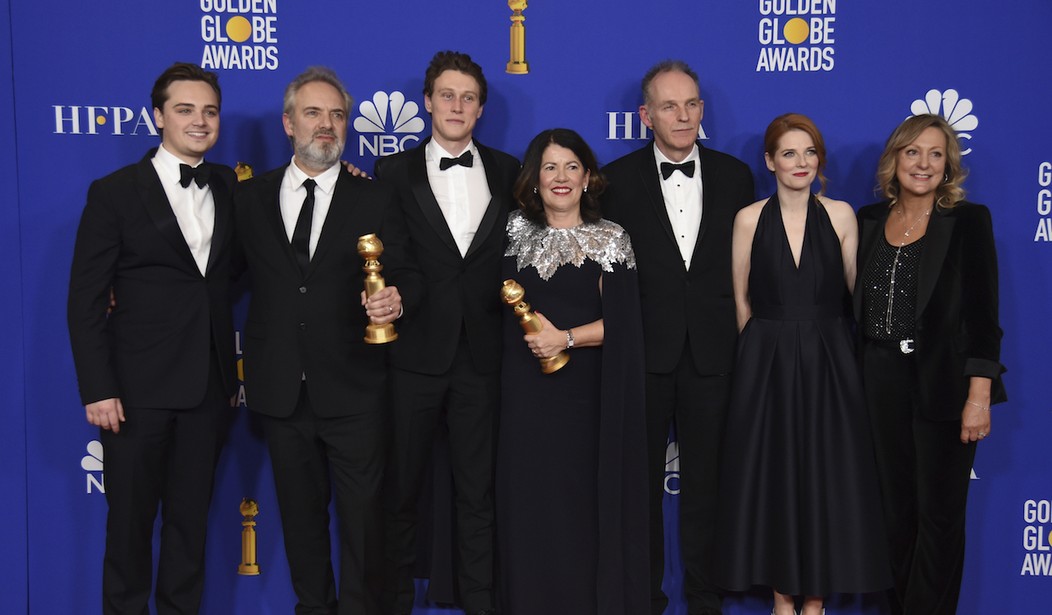Director Sam Mendes can hold his Best Director and Best Picture of the Year Golden Globes up high. Truly, once the Hollywood Foreign Press Association saw the extended one-shot Mendes pulled off for his epic war thriller, "1917," the other contenders didn't have a prayer.
What Mendes has achieved on the silver screen is nothing short of remarkable. "1917" pushes the editing boundaries by giving us one continuous shot of a daring mission in World War I.
For two hours, the audience can fully immerse themselves in that mission and forget they're in the theater. You're there in the trenches, the fields, and the fights, as Lance Corporals Schofield and Blake travel through no man's land to deliver an urgent message to one of their superiors. If they fail, 1,600 of their comrades are doomed.
George MacKay portrays Schofield, and Dean-Charles Chapman plays Lance Corporal Blake. The 22-year-old Chapman, who has previously starred in Netflix's “The King” and as Tommen Baratheon in HBO’s “Game of Thrones,” says his experience on "1917" was the most challenging role he's had yet.
The cast and crew filmed “1917” in a series of long shots that stick together to appear as though it’s one take, Chapman explained to Townhall in an interview on Wednesday. The longest shot, the actor recalled, was almost nine minutes long. They rehearsed for six months to get their chemistry with the cameras just right.
“The whole thing was choreographed,” Chapman said. “It literally was a dance between the camera and the actor. We were genuinely bouncing off of each other. So if I stepped a bit too far to my left and the camera would adjust where if the camera wasn’t quite ready, then I would hold my line and wait for the camera to fill in on my face. It was this whole flow and rhythm between the two things gelling together.”
Recommended
Chapman hit the nail on the head when he said the film acts more like a "video game." And the audience is Player 1.
Mendes's decision to rely on natural lighting was another successful gamble. On most film sets, Chapman explained, the actors often sit around waiting for the crew to set up the lighting rigs. Behind the scenes on "1917," they waited for the sun to be behind the clouds to keep continuity, and in the meantime they could keep "filming and filming and filming."
"We never really had any breaks," Chapman recalled, later adding, "There never really was any time to step out of character."
Chapman was perhaps also so in tune with his character, Corporal Blake, because of the realistic conditions in which they filmed. The actor once played Billy Elliott in London's West End. It's a three-hour show with a series of extended dance sequences. And Billy is in every scene. But that didn't quite prepare him for the six weeks of filming in muddy trenches for "1917."
"We were soaking wet and damp with mud and cold most days," Chapman said. "The ground was uneven to walk on, the mud is like walking on ice, it's slippery, the gear is really heavy."
But he'll tell you it was worth it. Not just because of the hardware the film took home from the Globes, but because Chapman learned about the heroics of one of his relatives. For research, Chapman read the "Western Front Diaries." One of the diary entries, he discovered, was written by his great-great-grandfather, David Henry Peers.
"He fought in the cavalry," Chapman shared. "One day when he was out in no man’s land, he was shot and paralyzed, and he was bleeding out four days trying to survive. Long story short, he ended up surviving the war. I didn’t know that before filming, so I’m really, really pleased I know that story because I would’ve never found out."
There are some marquee names in the film, such as Benedict Cumberbatch, Colin Firth, "Fleabag" star Andrew Scott, and Chapman's old "Game of Thrones" co-star Richard Madden. In "1917," they each have powerful cameos, but Chapman and MacKay carry most of the film. Thankfully, Chapman said he felt "no pressure" being part of a cast of that magnitude, because Mendes made them feel so comfortable on set.
It was Chapman's first time at the Globes last Sunday. Having found himself on stage after "1917" won Best Picture, he can tell you it was trial by fire.
"To be honest with you, I think I blacked out a little bit," Chapman said.
"I kind of didn't expect it," he added. "It kind of was a little bit of a shock."
Understandable, considering Dreamworks Pictures and Reliance Entertainment wrapped production in November and was a late contender for the Globes. It was a speedy turnaround.
"When I was standing there and looking out at the crowd, looking at all the people I admire," Chapman revealed, "I was a bit speechless, to be honest with you."
Most of all, Chapman hopes the Best Picture designation will get people to the cinema. Because that's really the only way to see it - in the theater, on the big screen.
"1917" is in theaters everywhere.

























Join the conversation as a VIP Member